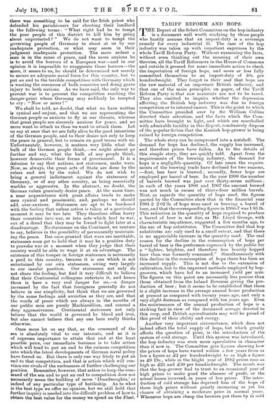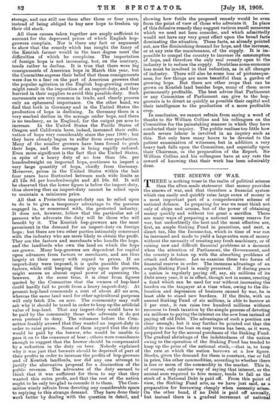TARIFF REFORM AND HOPS.
THE Report of the Select Committee on the hop industry is a document well worth studying by those people who hastily assume that an import-duty is a sovereign remedy for every industrial ill. The case of the hop industry was taken up with impatient eagerness by the whole Tariff Reform Party. Without examining the facts, without even thinking out the meaning of their own theories, all the Tariff Reformers in the House of Commons and outside it pressed for some immediate action to check the importation of foreign hops, and more or less fully committed themselves to an import-duty of 40s. per hundredweight. They forgot in their zeal that bops are the raw material of an im'portant British industry, and that one of the main principles, on paper, of the Tariff Reform Party is that raw materials are not to be taxed. They also omitted to inquire whether the depression affecting the British hop industry was due to foreign competition or to internal causes. This is the point to which the Committee presided over by Sir William Collins directed their attention, and the facts which the Com- mittee have brought to light, and which are marshalled with admirable lucidity in this Report, conclusively dispose of the popular fiction that the Kentish hop-grower is being ruined by foreign competition.
The whole story can be compressed into a nutshell. The demand for hops has declined, the supply has increased, and therefore prices have fallen. As to the details of this simple story, they are quickly told. Apart from the requirements of the brewing industry, the demand for hops is a negligible quantity. Of late years the require- ments of the brewing trade have declined for two reasons, —first, less beer is brewed ; secondly, fewer hops are employed per barrel of beer. In the year 1900 the number of barrels brewed was just over thirty-seven millions ; in each of the years 1906 and 1907 the amount brewed was not much in excess of thirty-four million barrels. Next, as regards the quantity of hops used, the figures quoted by the Committee show that in the financial year 1901-2 2.02 lb. of hops were used in brewing a barrel of beer, and that the corresponding figure in 1906-7 was 1.85 lb. This reduction in the quantity of hops required to produce a barrel of beer is not due, as Mr. Lloyd George, with characteristic impatience, suggested a few months ago, to the use of hop substitutes. The Committee find that hop substitutes are only used to a, small extent, and that there is no appreciable increase in the quantity used. The real reason for the decline in the consumption of hops per barrel of beer is the preference expressed by the public for a "lighter, brighter, and therefore less heavily hopped beer than was formerly consumed." Simultaneously with this decline in the consumption of hops there has been an increased supply. This is not due to the extension of cultivation, but to the improved methods employed by hop- growers, which have led to an increased yield per acre. The figures on this point are necessarily less precise than those obtained from the Inland Revenue giving the pro- duction of beer ; but it seems to be established that there is a slight increase in the average annual home production at present as compared with twenty years ago, and only a very slight decrease as compared with ten years ago. Even the maintenance of the annual production of hops is a striking fact in view of the decreased acreage devoted to this crop, and British agriculturists may well be proud of this proof of their ability and energy.
Another very important circumstance, which does not indeed affect the total supply of hops, but which greatly affects the question of price, is the introduction of the system of cold storage. Until this system was introduced, the hop industry was even more speculative in character than it now is. The Committee give figures showing how the prices of hops have varied within a few years from as low a figure as .g2 per hundredweight to as high a figure as .28 19s., while in the blight year of 1882 prices rose as high as .225 and £30 per hundredweight. The result was that the hop-grower had to trust to an occasional year of high prices to make good the absence of profit, or the actual losses incurred, in years of low prices. The intro- duction of cold storage has deprived him of the hope of these high prices without greatly increasing as yet his chance of obtaining a moderate price in normal years. Whenever hops are cheap the brewers put them by in cold storage, and can still use them after three or four years, instead of being obliged to buy new hops to freshen up their old stock.
AU these causes taken together are amply sufficient to account for the depressed prices of which English hop- growers complain. Nor is there any fact or argument to show that the remedy which has caught the fancy of the Kentish farmer would in the least degree meet the difficulties of which he complains. The importation of foreign hops is not increasing, but, on the contrary, tends rather to decline. It is true that there were big consignments of American hops in March this year, but the Committee express their belief that these consignments were due to a fear on the part of American growers that the popular agitation in the English hop-growing centres might result in the imposition of an import-duty, and they hurried in their supplies to avoid this possible duty. Such movements are very common in trade, and clearly possess only an ephemeral importance. On the other hand, we find that both in Germany and in the United States the production of hops is declining. In Germany there is a very marked decline in the acreage under hops, and there is no tendency, as in England, for the output per acre to increase. In the United States the Pacific States of Oregon and California have, indeed, increased their culti- vation of hops very considerably since the year 1900; but they have already begun to suffer from over-production. Many of the smaller growers have been forced to grub their hops, and the acreage is being rapidly reduced. Even more significant is the fact that the United States, in spite of a heavy duty of no less than 56s. per hundredweight on imported hops, continues to import a very large quantity of hops, chiefly from Germany. Moreover, prices in the United States within the last four years have fluctuated between such wide limits as .21 12s. 8d. per hundredweight and .25 16s. 8d. It will be observed that the lower figure is below the import-duty, thus showing that an import-duty cannot be relied upon to maintain a minimum price.
All that a Protective import-duty can be relied upon to do is to give a temporary advantage to the persons engaged in, or concerned with, the protected industry. It does not, however, follow that the particular set of persons who advocate the duty will be those who will benefit by it. The Kentish hop-growers are the most prominent in the demand for an import-duty on foreign hops ; but there are two other parties intimately concerned with the industry who are more likely to obtain the profit. They are the factors and merchants who handle the hops, and the landlords who own the land on which the hops are grown. Many hop-growers are dependent for capital upon advances from factors or merchants, and are thus largely at their mercy with regard to prices. If an import-duty were imposed, it is quite possible that the factors, while still keeping their grip upon the growers, might secure an almost equal power of squeezing the brewers. At the same time, it is clear from figures quoted by the Committee that the owners of hop-land could hardly fail to profit from a heavy import-duty. At present hop-land commands a rent of about ..t3 an acre, whereas the same land used for other agricultural purposes will only fetch 25s. an acre. The community may well ask why it should be taxed in order to keep up the artificial value of hop-land. That any import-duty would have to be paid by the community those who advocate it do pot even pretend to deny. The witnesses before the Com- mittee frankly avowed that they wanted an import-duty in order to raise prices. Some of them argued that the duty would be paid by the brewer, who would be unable to pass it on to the consumer of beer ; others were considerate enough to suggest that the brewer should be compensated by a reduction in the duty on beer. Nobody explained why it was just that brewers should be deprived of part of their profits in order to increase the profits of hop-growers and of Kentish landlords, nor did any one attempt to justify the alternative proposal for a diminution of the public revenue. The advocates of the duty seemed to think that it was sufficient for them to say that they wanted this extra profit, and that the rest of the nation ought to be only too glad to concede it to them. The Com- mittee wisely refrain from devoting any considerable space to replying to this strange demand. They have done their work better by dealing with the question in detail, and showing how futile the proposed remedy would be even from the point of view of those who advocate it. In place of this delusive remedy they suggest various small measures which we need not here consider, and which admittedly would not have any very great effect upon the broad facts dominating the situation. These facts, as already pointed out, are the diminishing demand for hops, and the increase, or at any rate the maintenance, of the supply. It is im- possible to compel the country to increase its consumption of hops, and therefore the only real remedy open to the industry is to reduce the supply. Doubtless some economic loss must be involved in that reduction, as in all changes of industry. There will also be some loss of picturesque- ness, for few things are more beautiful than a garden of growing hops. But there are other crops that can be grown on Kentish land besides hops, many of them more permanently profitable. The best advice that Parliament or any Committee of Parliament can give to the hop- growers is to divert as quickly as possible their capital and their intelligence to the production of a more profitable crop. In conclusion, we cannot refrain from saying a word of thanks to Sir William Collins and his colleagues on the Committee for the painstaking manner in which they have conducted their inquiry. The public realises too little how much severe labour is involved in an inquiry such as this. Not only have many hours to be devoted to the patient examination of witnesses, but in addition a very heavy task falls upon the Committee, and especially upon their Chairman, in the preparation of the Report Sir William Collins and his colleagues have at any rate the reward of knowing that their work has been admirably done.







































 Previous page
Previous page